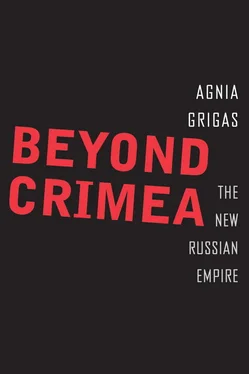Agnia Grigas - Beyond Crimea
Здесь есть возможность читать онлайн «Agnia Grigas - Beyond Crimea» весь текст электронной книги совершенно бесплатно (целиком полную версию без сокращений). В некоторых случаях можно слушать аудио, скачать через торрент в формате fb2 и присутствует краткое содержание. Город: New Haven, Год выпуска: 2016, ISBN: 2016, Издательство: Yale University Press, Жанр: Политика, Публицистика, на английском языке. Описание произведения, (предисловие) а так же отзывы посетителей доступны на портале библиотеки ЛибКат.
- Название:Beyond Crimea
- Автор:
- Издательство:Yale University Press
- Жанр:
- Год:2016
- Город:New Haven
- ISBN:978-0-300-21450-5
- Рейтинг книги:4 / 5. Голосов: 1
-
Избранное:Добавить в избранное
- Отзывы:
-
Ваша оценка:
- 80
- 1
- 2
- 3
- 4
- 5
Beyond Crimea: краткое содержание, описание и аннотация
Предлагаем к чтению аннотацию, описание, краткое содержание или предисловие (зависит от того, что написал сам автор книги «Beyond Crimea»). Если вы не нашли необходимую информацию о книге — напишите в комментариях, мы постараемся отыскать её.
[Contain tables.]
Beyond Crimea — читать онлайн бесплатно полную книгу (весь текст) целиком
Ниже представлен текст книги, разбитый по страницам. Система сохранения места последней прочитанной страницы, позволяет с удобством читать онлайн бесплатно книгу «Beyond Crimea», без необходимости каждый раз заново искать на чём Вы остановились. Поставьте закладку, и сможете в любой момент перейти на страницу, на которой закончили чтение.
Интервал:
Закладка:
STAGE 4: PASSPORTIZATION
The idea of providing ethnic Russians, Russian speakers, and others in the post-Soviet states with Russian passports has long appealed to the Russian government. As the next chapter will outline, in the early 1990s Moscow sought to establish the principle of dual citizenship in the post-Soviet space and at the same time sought to “passportize” whole regions outside its borders. In the global context, a number of states accept the principle of dual citizenship, and it could be argued that Moscow’s efforts to negotiate the principle with the sovereign post-Soviet states (especially in the case of Central Asia) were not unusual. However, Moscow’s passportization policies, which often violate the laws of the foreign states affected, differed significantly from accepted international norms. The policies undermined state sovereignty by encouraging often unlawful activities of handing out passports and by their targeting of specific populations of ethnic Russians and Russian speakers residing in particular foreign territories where Russia sought greater influence. They also targeted other minority populations like Ossetians and Abkhazians that resided in breakaway territories of Georgia. As a result there was fierce opposition from many countries to both Russia’s passportization efforts and the related principle of dual citizenship. In 2006, then First Deputy Prime Minister Medvedev argued that while “the international practice of the past several decades” rejects dual citizenship, it could become relevant as the CIS reached a level of integration comparable to that of the EU. 69Still among the CIS only Tajikistan has a formal agreement with Russia enabling dual citizenship while Kyrgyzstan and Armenia have not formalized the agreement but their citizenship laws could allow for it. Nonetheless, the semilegal practices of obtaining Russian citizenship continue unabated in much of the post-Soviet world since the early 1990s.
In some cases, the fact that residents of the former Soviet republics had not acquired citizenship in the newly independent post-Soviet states (due either to imposed legal constraints or to their own unwillingness) was also used by Moscow as a reason for passportization. The Russian government has maintained that if former citizens of the Soviet Union had not received citizenship in the new states, then “Russia as a legal successor to the Soviet Union was obligated to grant these people citizenship and rights under the Constitution of Russia.” 70This logic has been particularly relevant in Estonia and Latvia, which, as discussed in more detail in the chapter on the Baltic States, did not grant automatic citizenship to Soviet-era migrants who included many Russians and Russian speakers. Tallinn’s and Riga’s policies and the resulting passportless populations played well into Moscow’s hands, providing an arguably justifiable reason for their passportization as well as creating an international grievance. Meanwhile, in Georgia’s South Ossetia and Abkhazia and Moldova’s Transnistria, while Tbilisi and Chisinau granted automatic citizenship to inhabitants of these territories, separatist movements precluded many from obtaining Georgian or Moldovan passports. In these territories there was ready acceptance of Moscow’s passportization policies. However, in most other former Soviet republics, like Ukraine’s Crimea or northern Kazakhstan, Moscow was clandestinely and often illegally offering Russian citizenship to foreign citizens. Interestingly, Russian ethnicity was not a prerequisite for passportization in Moldova and Georgia. For instance, in the case of South Ossetia, there were virtually no ethnic Russians or native Russian speakers according to the 1989 census which lists ethnic Ossetians as making up 66 percent of the population and ethnic Georgians as totaling 29 percent. 71Whether targeting Russians or other nationalities, Russian passportization policies have played an important role in establishing and reinforcing separatism in Transnistria, Abkhazia, South Ossetia, and Crimea.
Indeed, passportization is no simple consular matter. While most countries focus their consular activities on tourism, cultural and educational exchanges, and migration of workers, Russia has made consular activities a means to its security and territorial ambitions. Moscow’s policies of protecting its citizens and compatriots abroad have rightfully made most post-Soviet countries suspicious of Russian consular activities. 72According to anthropologist Florian Mühlfried, passportization is a clear case of “a new form of imperialism by civic means.” 73Its origins have been said to date back to the Cold War, when the notion of socialist international solidarity was used as grounds for intervention throughout the world. In the Putin era it has been replaced by a paternalistic ideology of providing help to fellow citizens and compatriots in need—an ideology formulated in the modern language of human rights. 74
The main actors in the passportization process, in addition to Russian consulates, have been public organizations, field forces or special door-to-door brigades, and at times even individuals. In Georgia, when the 2002 new Russian Citizenship Law simplified procedures, the Russian government created passport application centers in Abkhazia and South Ossetia. 75At the same time a public organization, the Congress of Russian Communities, spearheaded the passportization process in Abkhazia and field forces traveled to remote mountain villages to hand out passports. 76In Crimea, the Russian consulate in Simferopol had been aggressively issuing Russian passports for years leading up to the 2014 conflict. 77The passportization policies achieved some success. According to the Russian Federal Migration Service, from 2000 to 2009 almost 3 million people living on the territory of the former Soviet Union beyond the Russian Federation had received Russian citizenship. 78Many among these were dual citizens, especially in countries like Moldova and Ukraine.
Russia has generally not forced its citizenship on its diaspora or other nationals. Russian citizenship has had some appeal for the Russian minority and other nationalities, as seen in South Ossetia, Abkhazia, Transnistria, Estonia, Latvia, and Armenia. First, any citizenship may hold appeal for people without passports as in Estonia and Latvia. Second, there are also economic motives for acquiring Russian citizenship, which makes it easier and less expensive to travel to Russia as it eliminates the need for visas—an attraction, for example, in Moldova, Georgia, and Armenia. Russians may seek frequent travel to Russia to visit their relatives while all nationalities may benefit from visa-free travel if they work in Russia or reside near the border with the Russian Federation and conduct business or trade across the border. Third, Russian citizenship entitles passport holders additional benefits such as education in Russia, child support payments, free health care, support for large families, worker and military pensions, and the right to vote in Russian presidential and Duma elections. 79Some of these benefits, though, are selectively administered and favor separatist territories. For instance, in 2008 Russian citizens residing in Moldova’s Transnistria received supplementary pension payments, while Russian citizens residing elsewhere in Moldova did not receive such payments. 80Lastly, the appeal of Russian citizenship may reflect the success Russia has achieved in its soft power efforts to maintain the loyalty of ethnic Russians and Russian speakers abroad and attract other nationalities.
STAGE 5: INFORMATION WARFARE
The previous four stages of the neo-imperialist trajectory all pave the way for the blitz of information warfare and mark a pivot point preceding more open aggression from Moscow. Information warfare is the aggressive use of propaganda to destabilize, demoralize, or manipulate the target audience and achieve an advantage over an opponent including by seeking to deny, degrade, corrupt, or destroy the opponent’s sources of information. Some use of propaganda, loosely defined as information of a biased or misleading nature used to promote a political cause or point of view, is common among states even during times of peace and is often perceived to be part of soft power efforts. However, a turn to information warfare signals an escalation of tensions and sometimes also a turn to military engagement. In the Russian National Security Concept of 2000, the term “information warfare” was introduced to describe the threats Russia was facing, and rather ambiguously, also as the “improvement and protection of the domestic information infrastructure and integration of Russia into the world information domain.” 81Russian analysts, when referring to the internal and external information warfare threats that the country faces, argue that such warfare also “presumes ‘nontraditional occupation,’ namely the possibility of controlling territory and making use of its resources without the victor’s physical presence on the territory of the vanquished.” 82In my proposed seven-stage trajectory, information warfare is a crucial turning point when an “urgent” need for the “protection” of Russian compatriots and citizens is conceptualized. However, information warfare campaigns are preceded by decades of softer propaganda tactics, spread of pro-Russia historical narratives, and efforts by Russian state-run media companies to capture the audience of post-Soviet states.
Читать дальшеИнтервал:
Закладка:
Похожие книги на «Beyond Crimea»
Представляем Вашему вниманию похожие книги на «Beyond Crimea» списком для выбора. Мы отобрали схожую по названию и смыслу литературу в надежде предоставить читателям больше вариантов отыскать новые, интересные, ещё непрочитанные произведения.
Обсуждение, отзывы о книге «Beyond Crimea» и просто собственные мнения читателей. Оставьте ваши комментарии, напишите, что Вы думаете о произведении, его смысле или главных героях. Укажите что конкретно понравилось, а что нет, и почему Вы так считаете.












